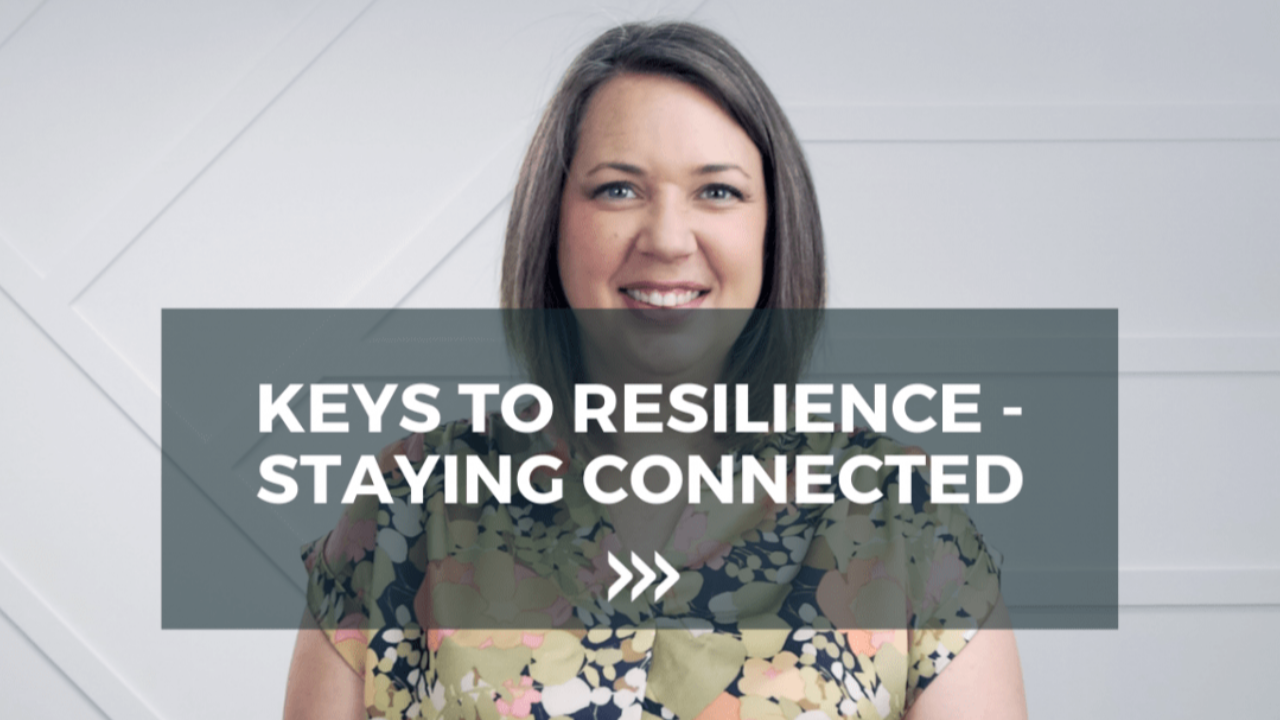KEYS TO RESILIENCE – STAYING CONNECTED
Jun 06, 2023
When people are going through difficult times they often isolate themselves. They don’t want to be a downer or they just don’t have the energy to put on a brave face and pretend everything is okay.
But we are created to be in relationship – with God and with others. By staying connected we become more resilient, allowing us to bounce back from struggle or hardship quicker.
In this series, I want to take time to reflect on the 7 Keys to Resilience. In this post, we are going to focus on the key of staying connected.
We often under-estimate the power of relationships, but it was one of the first things to be attacked in Eden.
In the garden, when the Devil tempted Eve and Adam followed suit, the first thing to occur was shame and separation between Adam and Eve. Further guilt and isolation occurred when they hid from the Lord. And finally, judgement and alienation were the results when Adam and Eve were removed from the garden.
HAVING A RELATIONSHIP WITH US WAS SO IMPORTANT TO GOD THAT HE SENT JESUS TO RESTORE WHAT WAS LOST.
It is a basic need to belong and be connected with others.
There have been social studies that show that without attachment to a mother, young fail to thrive despite having all the other basic needs to live. (https://bit.ly/3x6lpMi)

A frequent tactic of the devil is to try to create separation, isolation, and alienation between each other and between us and God. This is done by convincing us that we don’t belong, that we are not worthy enough, or that others reject us.
Unfortunately, in low or challenging moments, we tend to believe these lies and isolate ourselves leaving us vulnerable.
STAYING CONNECTED IS KEY TO RESILIENCE.
Resiliency is the ability to bounce back or not get stuck when facing hardship. Rather than an achievement earned or designation learned, The 7 keys to Resilience are disciplines that, when intentionally implemented, work.
For example, when we implement the first key – staying connected and having relationships with other people – we are able to receive support even when we don’t feel like it. We are able to avoid the destruction that comes with isolation.
In your role as a supporter, understanding the internal conversation of the person who is struggling is vital. They often tell themselves, “I don’t want to be a burden,” “I don’t have the energy to go,” and “people never take me up on my offer to call anytime.”
SO HOW DO YOU RESPECT PEOPLE’S DESIRE TO BE ALONE BUT STILL SUPPORT THEM, KNOWING THAT IT’S IMPORTANT TO STAY CONNECTED?
This delicate balance can be done by simple but powerful support strategies.
- Have short, frequent visits and conversations
- Engage in surface-level conversations about current events and “light” topics. Come prepared with things to chat about.
- Distract with an activity like watching a movie, playing a game or doing a puzzle, rather than try to have full conversations
- Go for a walk or drive so that there is no pressure to maintain eye contact and there are other distractions to focus on.
- Send notes, cards, emails or porch drop-offs showing there is connection and support while respecting the person’s space.
- Become comfortable with silence. You don’t have to fill every moment with chatter.
When supporting others these simple strategies are very powerful and show that you are connected without applying pressure.
As a caregiver, it is equally important to build your own resilience so that you can remain healthy in ministry.
Having supportive and trusting relationships as a ministry leader can be challenging. But hear me when I say it is worth the investment of time and energy to seek out mentors and to nurture relationships where you feel you can be authentic.
It is a discipline to invest in relationships. It’s so much easier to stay home and watch Netflix than it is to pick up the phone or spend what little time you have building a relationship. But having the discipline to build relationships creates a cushion that supports and fulfills that basic human need to belong and have a connection.
During the pandemic, I was asked what I think are the most important things to keep people well when the world is facing so much suffering and uncertainty. Staying connected was always at the top of my list. It is a key to resilience and well-being, and when ignored the impacts can snowball into destructive mindsets and behaviours.
I encourage caregivers and ministry leaders to have a habitual time when they connect with a trusting and authentic relationship.
If you would like to hear about the other 6 Keys to Resilience, check out the hopemadestrong.org/blog.

